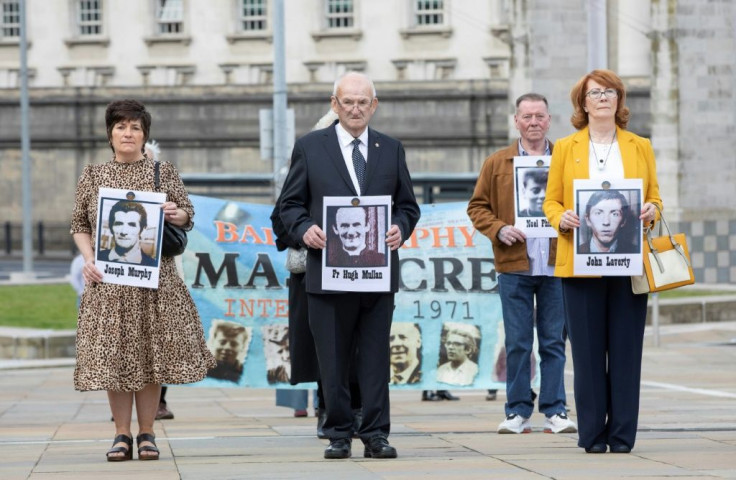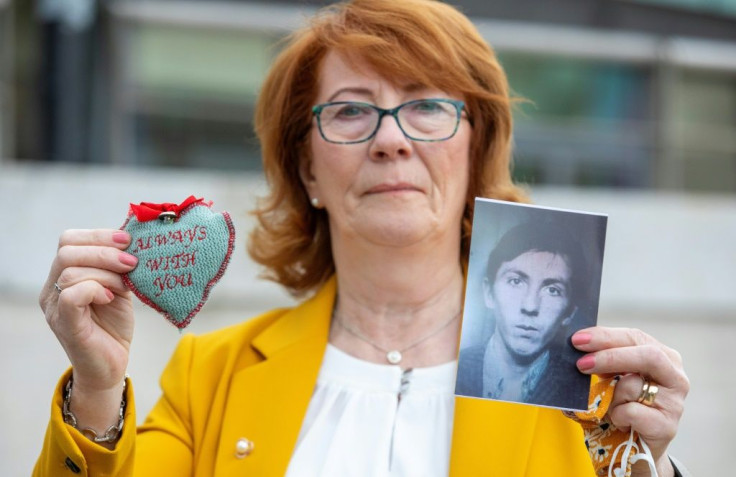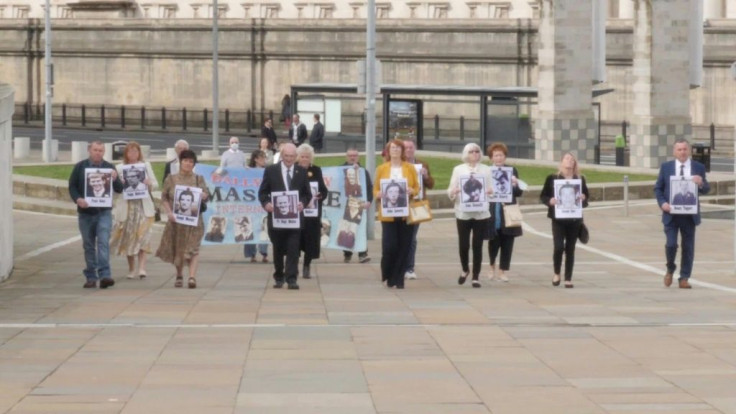Army Used 'Disproportionate' Force In 1971 NIreland Killings: Coroner
British soldiers used "clearly disproportionate" force during violence in Northern Ireland that saw 10 civilians shot dead nearly 50 years ago, a coroner ruled Tuesday, finding the victims all innocent of any crimes.
The 10 people were killed at the height of "The Troubles", a brutal sectarian conflict over British rule in Northern Ireland which raged over three decades until 1998 and left some 3,500 people dead.
The finding into the deaths in Ballymurphy, west Belfast, over three days in August 1971 were met with applause and tears from family members.
Relatives of the victims claimed paratroopers -- who the following year shot dead 14 civilians during a civil rights march on "Bloody Sunday" -- had "a licence to kill" and then covered up their actions, falsely claiming the dead had been members of violent paramilitary groups.

The UK government, however, remains determined to end what it calls "vexatious" prosecutions of any army personnel accused of wrongful deaths in past conflicts, and said it would soon introduce new legislation addressing the legacy of Northern Irish unrest.
The legislation will inflame tensions in Northern Ireland after fresh violence since the UK quit the European Union, a move which left the province in a regulatory half-way house between its markets in mainland Britain and in Ireland.
Mary Lou McDonald, president of the nationalist party Sinn Fein, said the inquest ruling was a "vindication" of a long campaign by the families of the Ballymurphy dead, who included a priest and a mother of eight children.
But she said it would be "bittersweet" because of British government efforts to prevent soldiers in the conflict from being prosecuted.
McDonald's deputy Michelle O'Neill, the deputy first minister in Northern Ireland, called the deaths "British state murder".

The inquest found all but one were shot by British soldiers, at a time when tensions were acute just after the authorities had introduced internment without trial of suspected paramilitary members.
"All of the deceased in this series of inquests were entirely innocent of any wrongdoing," the coroner, Judge Siobhan Keegan, told a hearing lasting over three hours.
"The army had a duty to protect lives and minimise harm, and the use of force was clearly disproportionate," she said.

In one case, Keegan said she could not make a "definitive finding" over who fired the fatal shot but described "the inadequacy of the original investigation as shocking".
The inquest -- the longest ever held in Northern Ireland -- began in November 2018 after original investigations recorded an open verdict and did not apportion blame.
Records from the time that could have identified the soldiers involved were lost, Keegan noted.
She split the 10 deaths into five investigations and delivered various verdicts, including that there was "no convincing evidence... to justify the shooting of the deceased" and "no justification provided by the army".
Dozens of relatives were present at the court, many clutching pictures of their loved ones and wearing T-shirts bearing their portraits.
"It's been 50 years," said Joan Connolly. "It's destroyed our lives, it really has. But we have justice today, we have peace. We have cleared my mummy's name," the 63-year-old said.
Anne Ferguson, whose father John McKerr was a former British army soldier in World War II and one of the victims, said she was relieved to have finally proved his innocence.
"His name has been tarnished as a gunman. That upset all of us... I'm just sorry that an institution like the British army that he was so proud of has been brought into disrepute," she said.
Across the border in the Republic of Ireland, Foreign Minister Simon Coveney said the findings were "an immense relief and vindication" for the families.
"Every family bereaved in the conflict must have access to an effective investigation and to a process of justice regardless of the perpetrator," he said.
The British government on Tuesday outlined its legislative agenda for the year ahead but failed to list a promised bill on protecting soldiers from prosecutions dating from The Troubles.
But Prime Minister Boris Johnson's spokesman said it was in the works. "We know there is more to do on this issue," he told reporters.
© Copyright AFP {{Year}}. All rights reserved.





















